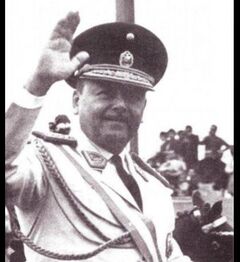Carmòn Solévereu: Difference between revisions
ContraViper (talk | contribs) |
ContraViper (talk | contribs) |
||
| Line 38: | Line 38: | ||
==Early Life== | ==Early Life== | ||
===Communist Theory=== | ===Communist Theory=== | ||
In regard to the failure of prior movements to bring about organic communist or socialist revolution in Inyursta, Solévereu blamed three major elements of Inyurstan culture: 1) private land ownership; explicitly the "[[Granjèchampé]]" system where most rural property was plots owned by small family units and held over generations as both business and heirloom (contrasted with the latifundia system of neighboring Cuscatlan); 2) the church; primarily the [[Néopròtestantaire]] church which preached Jesus as higher than any earthly authority, but also the Catholic church which he viewed as "in the pocket of the bourgeoises"; 3) | In regard to the failure of prior movements to bring about organic communist or socialist revolution in Inyursta, Solévereu blamed three major elements of Inyurstan culture: 1) private land ownership; explicitly the "[[Granjèchampé]]" system where most rural property was plots owned by small family units and held over generations as both business and heirloom (contrasted with the latifundia system of neighboring Cuscatlan); 2) the church; primarily the [[Néopròtestantaire]] church which preached Jesus as higher than any earthly authority, but also the Catholic church which he viewed as "in the pocket of the bourgeoises"; 3) the decentralized nature of Inyurstan politics and economics (by proxy of its geography). | ||
Prior to his coup, Solévereu quietly devised a process he called "'''Aggressive Deconstruction'''"; wherein top-down programs would be used to directly control and counter these cultural elements. Solévereu and his contemporaries believed that the groundwork for a true socialist people's republic could only be laid when the existing "cultural infrastructure" had been removed. In their eyes, grassroots or organic uprisings would not work in the face of a decentralized Inyursta, where at best any gains would be isolated and fragmented by geography and at worst they would simply fail to take hold among the locals. Ergo, only a strong centralized state authority could bring about nation-wide progress, break down the church and land ownership, and invest in infrastructure to counter decentralization. | |||
Another element of Solévereu's Aggressive Deconstruction theory was that the military and police (with extreme exception to officers either part of or on the payroll of the upper class and local, rural sheriffs) were not inherent allies of the bourgeoises, but in fact a neutral element that could be captured and turned against capitalist elements. | |||
==As First Director== | ==As First Director== | ||
Revision as of 19:46, 26 April 2022
Carmòn Iglé Solévereu de Pêsche was an Inyurstan dictator who ruled from 1956 until his death in 1968, though due to the Inyurstan Civil War his territorial reign was progressively diminished until his demise at the hands of counter-revolutionary forces.
Early Life
Communist Theory
In regard to the failure of prior movements to bring about organic communist or socialist revolution in Inyursta, Solévereu blamed three major elements of Inyurstan culture: 1) private land ownership; explicitly the "Granjèchampé" system where most rural property was plots owned by small family units and held over generations as both business and heirloom (contrasted with the latifundia system of neighboring Cuscatlan); 2) the church; primarily the Néopròtestantaire church which preached Jesus as higher than any earthly authority, but also the Catholic church which he viewed as "in the pocket of the bourgeoises"; 3) the decentralized nature of Inyurstan politics and economics (by proxy of its geography).
Prior to his coup, Solévereu quietly devised a process he called "Aggressive Deconstruction"; wherein top-down programs would be used to directly control and counter these cultural elements. Solévereu and his contemporaries believed that the groundwork for a true socialist people's republic could only be laid when the existing "cultural infrastructure" had been removed. In their eyes, grassroots or organic uprisings would not work in the face of a decentralized Inyursta, where at best any gains would be isolated and fragmented by geography and at worst they would simply fail to take hold among the locals. Ergo, only a strong centralized state authority could bring about nation-wide progress, break down the church and land ownership, and invest in infrastructure to counter decentralization.
Another element of Solévereu's Aggressive Deconstruction theory was that the military and police (with extreme exception to officers either part of or on the payroll of the upper class and local, rural sheriffs) were not inherent allies of the bourgeoises, but in fact a neutral element that could be captured and turned against capitalist elements.
As First Director
His first policy was abolishing private property, which was largely laughed off by Inyurstan blue collar and white collar workers alike as everyone still de-facto controlled their own land. Another initial target was all religious institutions for which his administration began levying extreme taxes on the church, including income taxes on all donations and income, "rent taxes" for use of "public land", and excise taxes for all manner of things deemed "anti-social". Hit hardest was the Néopròtestantaire church, which was also targeted for sedition due to its teachings against
